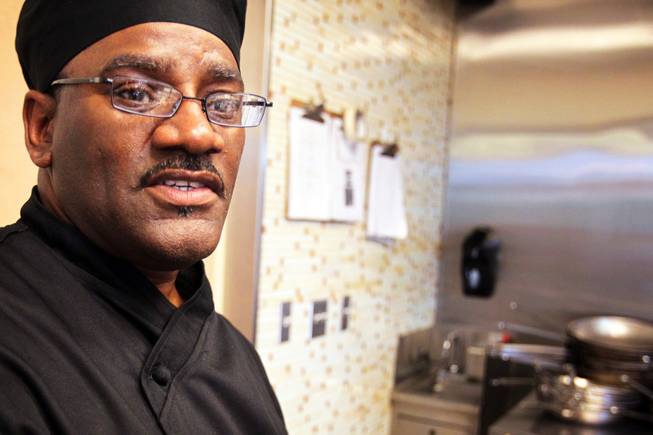
Guy Moore works as a chef at the Westside Bistro in Las Vegas on Wednesday, August 22, 2012.
Thursday, Aug. 23, 2012 | 2 a.m.
Watch KSNV reporter Marie Mortera’s story about this topic at 4 p.m. and 6 p.m. on Channel 3.
Guy Moore knows the cost of a bad decision.
It started with a jewelry theft topping $5,000. A 10-month prison term followed. During that time, he lived in constant fear of violence in a 10-by-8 cell.
Then came July 28, 2011. That was the now 48-year-old’s release date from High Desert State Prison, or, as he says, “a day you don’t forget.”
Moore entered a Las Vegas parole and probation office with a fresh mindset and vowed to change his course in life.
But there was a problem.
His prison term resulted in the loss of his job, car, home, family — “pretty much everything,” he said.
It’s a story police and court officials say they hear time and again: former inmates re-entering society with little direction and even fewer resources. They have scant cash, dubious housing and lack of proper identification.
“The majority of people really do want to change,” said Jon Ponder, founder of Hope for Prisoners, a nonprofit that helps ex-offenders transition into society. “They have no idea how to do it.”
The predicament can nudge former inmates back into a life of crime, creating a revolving door of offenders cycling in and out of prison, officials said.
A study released last year by the nonpartisan Pew Center found that more than 40 percent of offenders nationwide returned to state prison within three years of their release. In Nevada, recidivism hovers just above 26 percent — a figure also measured by offenders who returned to state prison within three years, said Brian Connett, deputy director of the Nevada Department of Corrections.
Public safety officials in Las Vegas, however, presume the percentage could be at least double because it doesn’t account for offenders returning to city or county jails.
“It’s very common for someone who gets out of prison to go back and stay with a friend or put themselves in a situation that is not very healthy,” said Judge Linda Bell, who recently took over Clark County District Court’s specialty courts. “They have no tools.”
The recidivism rate has a definite impact on taxpayers’ pocketbooks. In Nevada, the average annual cost per inmate is $20,656, according to the Vera Institute of Justice.
Moore resurrected his life with the help of the Las Vegas Urban League’s RExO Champs, a program designed to aid recently released offenders.
Now Moore works at the Culinary Academy of Las Vegas as a chef in its Westside Bistro. He received funding through the Urban League to attend the Culinary Academy and was hired a few months later.
Although he previously worked in the Los Angeles area catering Hollywood events, Moore felt he needed a way to jump-start his career in Las Vegas, given his felony conviction.
“To come out of prison and blend back into society, well, here in Las Vegas, it’s a little tough,” he said. “A lot of people come to this town — a lot of money — and they need people they can trust. They have a lot at stake here.”
Re-entry advocates in Las Vegas said it’s a gradual process to gain the trust of local employers — made doubly hard by an excess of talented people who find themselves unemployed because of the economy.
Chad Baker, a Metro Police officer in West Las Vegas, has been mentoring former inmates for two years at Urban League, 1024 W. Owens Ave. He grew frustrated arresting the same people all the time in the department’s Bolden Area Command.
As a mentor, Baker seeks to mend relationships with ex-offenders and help them find employment at nearby businesses, such as grocery stores.
“It’s one thing for an ex-offender to go into a business to try to get a job,” he said. “It’s another when an ex-offender walks in while a Metro Police officer is by their side.”
It’s not always an easy sell, though.
“They hear the ex-felon part and they cringe,” Baker said.
He tries to reassure owners by telling them he only advocates for people he feels will live up to his recommendation.
Hope for Prisoners, which relies on donations, has adopted a similar practice, Ponder said. His 18-month program starts with a prevocational workshop addressing everything from the importance of a learning attitude to dressing for success.
From there, each offender receives a mentor who keeps tabs on his or her progress with employers. Hope for Prisoners has about 160 volunteers from faith-based communities who serve as mentors, Ponder said.
“We can put an individual in a class, but if we don’t come alongside that individual and help them to walk out what he’s just learned, we’ve done absolutely nothing,” he said.
Ponder credits his time served in federal prison for a bank robbery with helping him turn his life around and understand what inmates need for successful transitions into society.
“My entire time in prison, I didn’t go to prison,” he said. “I went to school. I used every bit of time in prison to learn and grow.”
Ponder moved back to Las Vegas and created Hope for Prisoners as soon as he was released in 2009 from a maximum-security federal prison in Pennsylvania. Of the 210 offenders who attended the prevocational workshop, 61 percent now have full-time jobs, he said.
Long-term success ultimately hinges on a person’s desire to change, said John Butler, outreach coordinator for the Urban League’s RExO Champs program.
“They have to be able to obtain and secure (jobs) on their own, which is part of that self-sufficiency,” he said. “We guide and advocate for them.”
One re-entry program, however, is on the brink of extinction. Clark County’s Reentry Court — a special program similar to Drug Court — no longer has funding, Bell said.
Money for Reentry Court previously had come from Clark County’s specialty courts fund, which is separate from the county’s general fund, said Steven Roll, specialty courts manager. A tighter budget in fiscal year 2012, which ended in June, led to the elimination of funding for Re-entry Court. Future funding likely would need to come from the Administrative Office of the Courts or the Nevada Department of Corrections, Roll said.
Because it’s a judicial program, participants in Reentry Court face an immediate return to custody if they violate certain terms or conditions.
“In Clark County, the program will be eliminated if a funding source cannot be worked out,” Bell said. “That would be terrible.”
Bell described re-entry programs as a win-win for the community. It would ease jail and prison overcrowding while reducing crime, she said.
“I think it’s a really important issue,” said Bell, a public defender before becoming a judge. “Very little attention is paid to it. We can’t just hope for a better outcome unless we start doing something differently.”


Join the Discussion:
Check this out for a full explanation of our conversion to the LiveFyre commenting system and instructions on how to sign up for an account.
Full comments policy